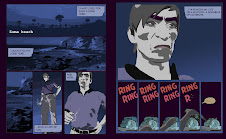Sunday, September 15, 2024
Saturday, February 20, 2021
| |
| |
Carter does a titch of flashing herself in "Posing," a Vancouver-lensed TV-movie based on the true-life stories of three women who posed for Playboy, scheduled for Oct. 29. This week, she's mostly flash, starring opposite Patrick Duffy in the adaptation of "Danielle Steel's 'Daddy"' (NBC, Oct. 23). | |
Sitting in an alcove of her Vancouver hotel, Carter is draped in a ponchoish affair over a high-collared sweater and slacks. Her shoulder-length, highlighted brunette hair is pulled back, accenting the classic face with its famous hooded grey-blue eyes, Renoirperfect upturned nose and Cupid’s bow pout. Glamor is her turf. | |
"Danielle Steel-who I love, I've read all her novels-strikes a certain chord," she says over sips of iced tea. And "Daddy" has a chord of harmonic resonance that true love will out-at least this time. Patrick Duffy plays a man with three children (not unlike his current Step by Step character) whose wife (Kate Mulgrew) leaves him to find herself, finds someone else and then dumps Duffy. On to the scene comes a TV star (Carter) from a prime-time law drama in which she plays a public defender. | |
"It's one of the few Danielle Steel stories where the man is the central character," says Carter. "It's about the way people put expectations on each other and are disappointed. But it's a Danielle Steel story, so it's a romance. The woman I play is down to earth; you want her to be your best friend. She's very famous, but doesn't take the fame stuff seriously. And neither do I" | |
It's this latter that now makes Lynda Carter the creature she always wanted to be, not the 24-year-old who was cast for Wonder Woman (1976-79). The series shot Carter to fame and riches, though her acting was often ancillary to a superstructure revealed by a scanty costume that by today's standards looks positively clunky and safety padded. | |
Carter, a former pizzeria chanteuse, expanded her horizons into a million selling poster, Vegas shows, an album and a series of musical TV specials. TV-movies like "Rita Hayworth: The Love Goddess" followed and did well. Then a series, 1984's Partners in Crime -with Carter and Loni Anderson playing the ex-wives of a deceased cad detective who inherit his PI biz-failed miserably. Says Carter, "The only good thing about it was that Loni and I have remained friends." | |
Between then and now, Carter went on to her second marriage-to Washington attorney Robert Altman (who at the moment is entangled in the Bank of Credit and Commerce International mess)-and had two children Jamie, 3, and Jessica, 1. She was disillusioned with a career that treated her as "a commodity"; she wanted to ditch acting, and credits her husband with advising her not to give up all she'd worked for. To that end, she took acting lessons and allows that that process now makes producers think of her as more than a physical presence. | |
Still, with "Posing" there's no denying her physical being was a first-order demand. And while she does not deny the salacious appeal of bathtub and lingerie scenes, she says that "the opportunity to see me in Playboy-type things is only the drawing card. The story is really why this woman is doing it. There are scenes that every woman in North America will identify with. There's this inner struggle in her marriage. Her husband is not a bad guy. She's just part of the scenery that belongs to him. They've been married 17 years, and now she's a mother and he doesn't think of her as a sexy woman and she's just starting her prime. She doesn't want a divorce, doesn't want an affair, doesn't want to leave her family. So when they ask her to pose, she sees it as a lark. She's having such a blast-she's dressed in great things, and people are fussing over her-that she sort of loses her head and bares all and doesn't really consider the consequences until this very private photo session gets published. And when it does, she's ostracized in her community and her husband leaves her." | |
Carter can relate to the ramifications of baring it all. In 1976, she appeared topless in a low-budget movie, "Bobbie Jo and the Outlaw," and when she became famous, men's magazines published stop frames of her chest. "I was a baby," sighs Carter. "I hadn't worked in a year, and it was the lead in a movie. I don't want to apologize for doing it, because I didn't do anything that was so outrageous, but it was a terrible movie that has not died simply because I'm topless in it." | |
Carter doesn't think about that part of her past much now. She credits motherhood with giving her life a new perspective: "It gives you new depth to what you feel, and you can pull up from that and put it on the screen into any situation. But people think you're dead if you're not on TV for a year or two. I'm hoping the public will welcome me back, that they can still watch me. But I'm beyond all the ego stuff now. I have substance in my personal life, and now I want that in my professional life. The fame and the money don't matter any more." | |






















